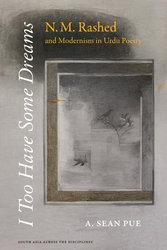Resource Page
Welcome! This is a resource page for my book, I Too Have Some Dreams: N. M. Rashed and Modernism in Urdu Poetry (University of California Press, 2014). Below you will find the table of contents and also links to the thirty poems in the appendix. UC Press has made the Introduction available as an excerpt.
For those of you who can understand Urdu or Hindi, you can now click the poem title below and use the language selectors in the bar above to view the poems in Urdu script and transliteration. Devanagari will be added soon. The appendix in the printed book has the poems in transliteration on the verso (left) side and in translation on the recto (right) side.
Acknowledgments
Note on Transliteration
1. Embodiment
2. Position Without Identity
3. Allegory and Collectivity
4. Temporality
Conclusion: Hasan the Potter
Appendix: Poems in Transliteration and Translation
§2. Ek din—lārins bāġh meñ (ek kaifiyat)
§7. Ḥuzn-e insān (aflāt̤ūnī ʿishq par ek t̤anz)
§16. Vuh ḥarf-e tanhā (jise tamannā-e vaṣl-e maʿnā)
§18. Dil, mire ṣaḥrā-navard-e pīr dil
Notes
Bibliography
Index
Book Description
I Too Have Some Dreams explores the work of N. M. Rashed, Urdu's renowned modernist poet, whose career spans the last years of British India and the early decades of postcolonial South Asia. A. Sean Pue argues that Rashed’s poetry carved out a distinct role for literature in the maintenance of doubt, providing a platform for challenging the certainty of collective ideologies and opposing the evolving forms of empire and domination. This finely crafted study offers a timely contribution to global modernist studies and to modern South Asian literary history.
Blurb
“This is a tour de force in the study of Urdu literary history. Pue’s study is beautifully crafted, thoughtfully argued, and meticulously researched. This is one of the best studies of N.M. Rashed’s life and poetry available.”
— Syed Akbar Hyder, Associate Professor of Asian Studies & Islamic Studies, University of Texas, Austin
